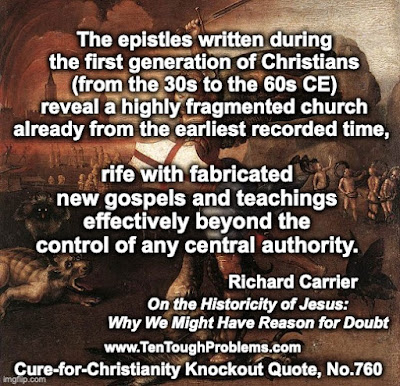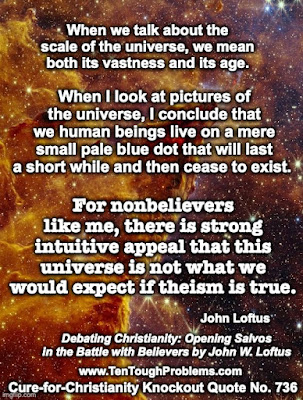Chapter 13: The Bethlehem Star, by Dr. Aaron Adair, in Christianity in the light of Science: Critically Examining the World's Largest Religion (Amherst, NY: Prometheus Press, 2016): 297-313. [Used with permission].
About two
centuries ago, there was a major transition in the way scholars were
approaching the stories of the Bible, both the Old and New Testaments. There
was a greater attempt to look at the historical context and formation of the
holy book and its stories, and the tales of Jesus were a major issue for
critical scholars and theologians. It was also at around this time that the
acceptability of wondrous stories was not palatable, at least for the educated
where a deistic god was more ideal, one that did not perform miracles and was consistent
with the universe of Newtonian mechanics. A naturalistic understanding of the
world, inspired by the success of the physical sciences, along with inspiration
from Enlightenment thinkers, changed the way people looked at the world, and
that caused for a significant reassessment of the spectacular stories of the
ancient world. What was one to do with the miracle stories of Jesus if miracles
don’t happen? The solution was a series of rationalizations, none seen as
terribly plausible but preferable to claiming a miracle or a myth. For example,
Jesus walking on water was a mistake on the part of the Disciples, seeing their
master walk along the beach shore on a foggy morning and not actually atop the
water. Even the resurrection of Jesus was so retrofitted into scenarios that
are unlikely, to say the least, but at least they weren’t impossible.
Chapter 2: The Fact of Religious
Diversity
This chapter supports my first contention—that people
who are located in distinct geographical areas around the globe overwhelmingly
adopt and justify a wide diversity of mutually exclusive religious faiths due
to their particular upbringing and shared cultural heritage. This is the Religious Diversity Thesis (RDVT), and it is a well-established fact in today’s world.
The problem of religious diversity cries out for reasonable explanation,
something that faith has not provided so far. Attempts to mitigate it or
explain it, as we’ll see, either fail to take it seriously or explain religion
itself away.
Below is Appendix C from my book, Unapologetic: Why Philosophy of Religion Must End (Pitchstone Publishing, 2015), pp. 257-271. You're welcome! Given the influence of Alvin Plantinga and William Lane Craig, I doubt very much believers have heard these issues discussed like this before. I share it in hopes you'll like what I write enough to read the whole book.
The Demon, Matrix, Material World,
and Dream Possibilities,
by John W. Loftus
Bill Craig answers questions on his website Reasonable Faith. This one was published on October 31, 2011: Q #237 "Is Appeal to the Witness of the Holy Spirit Question-Begging?"
The following is the text of a portion of their 1999 Ohio State University debate on the question “Did Jesus of Nazareth Rise from the Dead?” the audio of which was published on October 17, 2013, https://www.youtube.com/watch?v=I1vaqsnhgJY. This text was published as an Appendix in my book, Unapologetic: Why Philosophy of Religion Must End.
[Republished post from 3/03/ 2012]
In a very well-written comment EricRC, a Ph.D. student in philosophy with promise, sums up what he calls the fundamental objection to the Outsider Test for Faith (OTF). Before sharing and then critiquing what he wrote let me refresh my readers on what it is:
The
evidential problem of horrendous suffering is one of the most powerful refutations of the
theistic god as can be found: If there’s a theistic omni-everything god, who is
omnibenelovent (or perfectly good), omniscient (or all-knowing), and omnipotent (or all-powerful), the issue
of why there is horrendous suffering in the world requires an explanation. The
reason is that a perfectly good god would want to eliminate it, an all-knowing god
would know how to eliminate it, and an all-powerful god would be able to eliminate
it. So the extent of horrendous suffering means that either god does not care
enough to eliminate it, or god is not smart enough to to eliminate it,
or god is not powerful enough to eliminate it. The stubborn fact of horrendous
suffering means something is wrong with god’s goodness, his knowledge, or his
ability.
[See the Tag below for my introduction to these series of posts]. When I looked again at the book files that the late John Beversluis sent me in 2008, he included a Preface, an Introduction, and not six but seven chapters. Here for the first time are his Preface and Introduction. What he wrote is as good as I remembered! It's also more timely today than it was thirteen years ago.
I was asked for books I might recommend that would fall into the category of "best arguments for God/Christianity" and "best arguments against Christianity." I was asked because "I know you read and analyze these books fairly often, so I want to see the best both sides have to offer." My response follows. You may be surprised by it!





